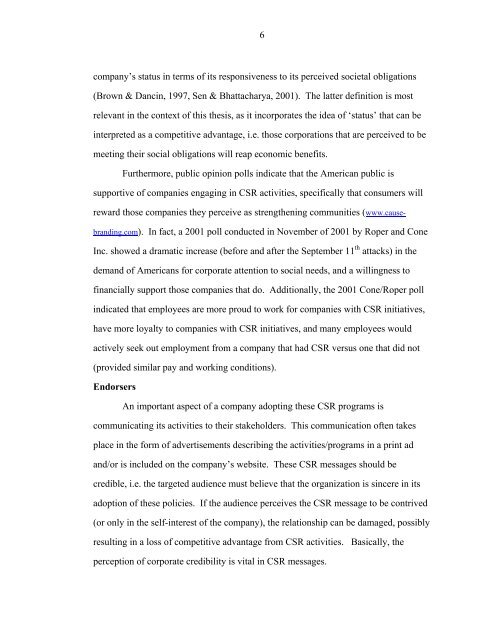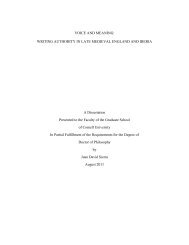Briana Anderson - Cornell University
Briana Anderson - Cornell University
Briana Anderson - Cornell University
Create successful ePaper yourself
Turn your PDF publications into a flip-book with our unique Google optimized e-Paper software.
company’s status in terms of its responsiveness to its perceived societal obligations<br />
(Brown & Dancin, 1997, Sen & Bhattacharya, 2001). The latter definition is most<br />
relevant in the context of this thesis, as it incorporates the idea of ‘status’ that can be<br />
6<br />
interpreted as a competitive advantage, i.e. those corporations that are perceived to be<br />
meeting their social obligations will reap economic benefits.<br />
Furthermore, public opinion polls indicate that the American public is<br />
supportive of companies engaging in CSR activities, specifically that consumers will<br />
reward those companies they perceive as strengthening communities (www.cause-<br />
branding.com). In fact, a 2001 poll conducted in November of 2001 by Roper and Cone<br />
Inc. showed a dramatic increase (before and after the September 11 th attacks) in the<br />
demand of Americans for corporate attention to social needs, and a willingness to<br />
financially support those companies that do. Additionally, the 2001 Cone/Roper poll<br />
indicated that employees are more proud to work for companies with CSR initiatives,<br />
have more loyalty to companies with CSR initiatives, and many employees would<br />
actively seek out employment from a company that had CSR versus one that did not<br />
(provided similar pay and working conditions).<br />
Endorsers<br />
An important aspect of a company adopting these CSR programs is<br />
communicating its activities to their stakeholders. This communication often takes<br />
place in the form of advertisements describing the activities/programs in a print ad<br />
and/or is included on the company’s website. These CSR messages should be<br />
credible, i.e. the targeted audience must believe that the organization is sincere in its<br />
adoption of these policies. If the audience perceives the CSR message to be contrived<br />
(or only in the self-interest of the company), the relationship can be damaged, possibly<br />
resulting in a loss of competitive advantage from CSR activities. Basically, the<br />
perception of corporate credibility is vital in CSR messages.

















